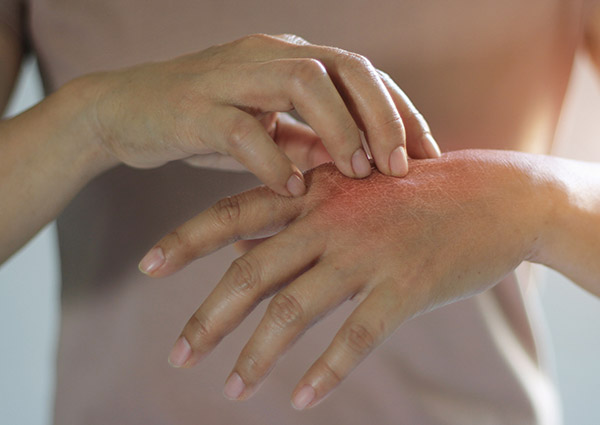
Hives: Causes, Treatment & Prevention
What are Hives?
Anyone who has suffered through itchy, angry skin bumps after eating or touching the wrong thing has likely experienced the discomfort and annoyance of hives.
Hives (uticaria) are skin-colored or red welts or bumps that are stinging, itchy and/or painful. They can range from tiny pen-tip up to dinner-plate size. Some may connect to form larger welts. They may blanch, or turn white in the center when pressed.
Usually, hives disappear in 24 hours or less, but at times they may last up to several weeks. Often with longer cases, as some hives fade, new ones may pop up. Anytime hives last continually for more than six weeks, they’re considered chronic uticaria.
Additionally, some people will have welts under the skin, causing swelling. This may cause eyelids and lips to swell. Anytime this occurs, emergency treatment is required to prevent a possible anaphylactic reaction. *
What Causes Hives?
Most often, hives are caused by medicine reactions, insect bites or stings, or exposure to animals like cats or dogs, or pollen. They can also happen after touching an allergen such as latex, or after allergy shots are administered.
Less common reasons for hives include:
- *Illnesses
- *Sun exposure (also known as solar uticaria)
- *Exposure to heat, cold or water
- *Exercise
- *Stress
- *Pressure from sitting or lying down too long
- *Contact with chemicals
- *Scratching
Hives can happen in minutes up to a couple hours after being exposed to the allergen.
How to Treat Hives
A doctor will likely perform a physical exam, ask health history questions, and then ask specific questions to help narrow down the culprit suspected of causing the hives. Additionally, your physician may do blood work to check for infections or illnesses such as vasculitis, lupus or thyroid diseases.
Treatment is usually an antihistamine, preferably a non-drowsy variety if it’s strong enough. Other treatments may include prednisone (a corticosteroid), Dapsone (an antibiotic known to relieve redness and swelling), or Omalizumab, (an injection for chronic cases of uticaria).
*For more severe cases involving swelling especially of lips, tongue, mouth or eyes, particularly with difficulty breathing or swallowing, call 911 immediately as it may be anaphylaxis. If person with hives and swelling has an epinephrine auto-injector (Epi®Pen), they should be given an injection immediately without waiting for an ambulance. Giving epinephrine isn’t dangerous, so don’t worry about being positive it’s anaphylaxis; not giving it when needed, however, can result in anaphylactic shock and may be fatal.




